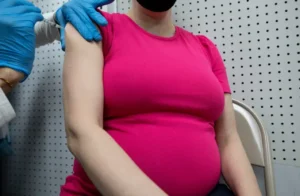Researchers say the findings can help doctors council pregnant women on which trimester is best to receive a COVID vaccine.

Since the COVID-19 vaccine rollout, data has indicated that inoculation during pregnancy can help to protect both the mother and baby.
New research collaboratively conducted at Massachusetts General Hospital (MGH) and Brigham and Women’s Hospital (BWH), published in the peer-reviewed Nature Communications, looked further into the extent of this protection by examining which vaccine is most effective, and when.
“We hope to use this information to better counsel patients wondering about vaccination in the first versus the second or third trimester.”
Andrea Edlow
“Our goal was to compare maternal antibody responses and transplacental transfer of antibody to the neonate with vaccination across all three trimesters of pregnancy, and across different vaccine platforms (Moderna, Pfizer, and Johnson & Johnson). We hope to use this information to better counsel patients wondering about vaccination in the first versus the second or third trimester,” said senior co-author Andrea Edlow, a physician at MGH.
Research and results
The team examined 158 pregnant individuals and characterized antibody responses after Moderna, Pfizer and J&J vaccines. Additionally, they looked at the transfer of protective antibodies via the placenta from mother to fetus by analyzing maternal and umbilical cord blood in 175 maternal-neonatal pairs.
They found that the mRNA vaccines elicited more functional SARS-CoV-2-specific antibodies compared with the J &J shot.
Moreover, first and third-trimester vaccination led to enhanced maternal immune responses compared to second-trimester vaccination, and the transfer of SARS-CoV-2-specific antibodies to the fetus from the placenta was most efficient following first and second-trimester inoculation.
More research on the topic is needed, the team said.
“Additional studies are needed to understand how to optimize maternal and neonatal immunity induced by vaccines in general during pregnancy,” said senior co-author Kathryn J. Gray, a BWH physician.
